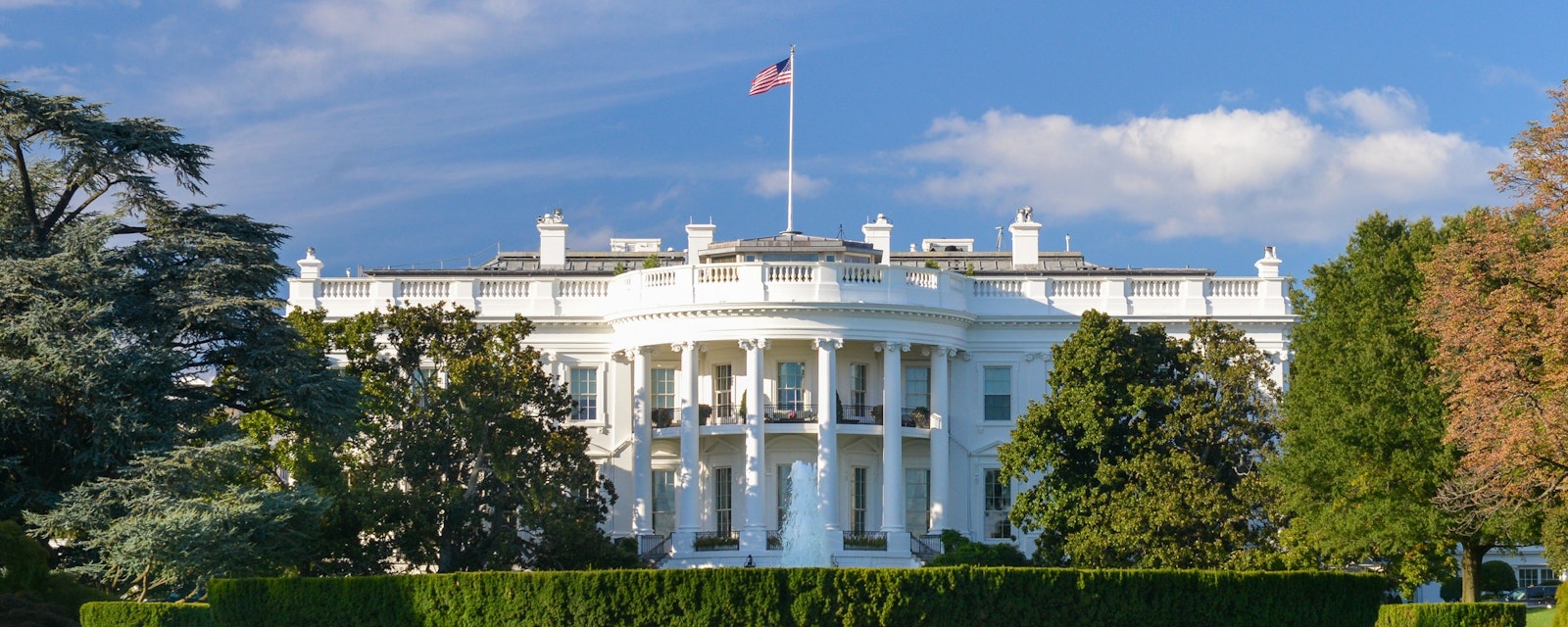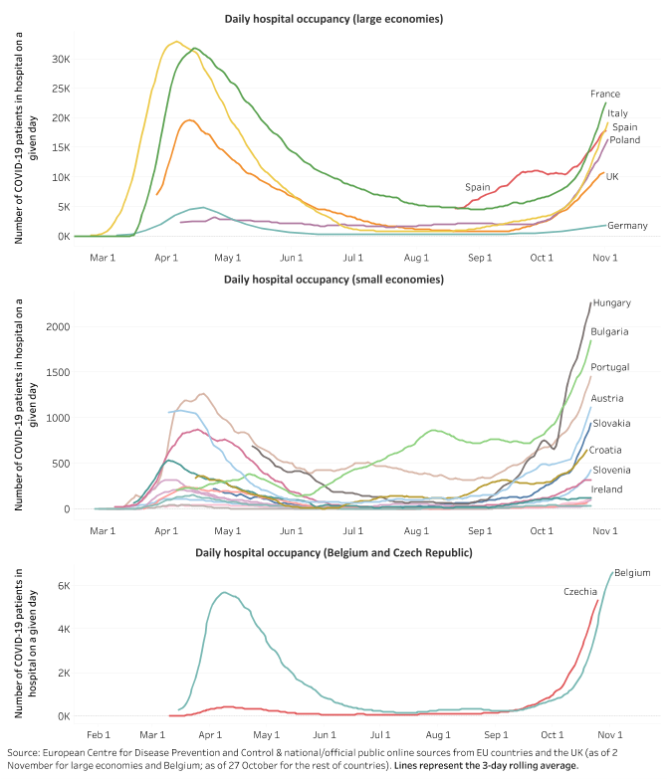While all eyes are on the 3 November US elections, here is what else should be watched this week: European countries are implementing harsher restrictions again. China’s latest Covid-19 outbreak seems to have been contained. Peru’s Congress will decide whether to start an impeachment process against the president. Cote d’Ivoire’s election results will be published this week.
Meanwhile, the result of a regional referendum in Japan might have national implications, Germany’s Christian Democrats will elect a new party leader in January, Brazil’s Congress will debate a series of presidential vetoes, and in Tanzania protests are expected after last week’s general election.
Chart of the Week
The increase in Covid-19 patients in hospitals and the fear of ICU shortages is prompting governments to introduce new restrictions. In large economies, the number of Covid-19 patients in hospital is still below the March/April peak; however, the curve is particularly steep in France and, most recently, in Italy. In most Central and Eastern European countries, as well as in Belgium, Austria and Portugal, the number of Covid-19 patients in hospital is at the highest since the beginning of the pandemic. Against this backdrop, the currently new nationwide measures might be followed by extended or additional restrictions in the coming weeks.
What to Watch
Europe
In Italy, a new set of coronavirus rules is set to be announced by 3 November. This will include the fourth emergency decree announced since 13 October. New measures being discussed reportedly include a nationwide evening curfew and possible restrictions on travel between regions. Meanwhile, new nationwide lockdowns have begun in France, Germany, Belgium, and other countries, and the UK will follow suit on 5 November. In Spain, many regions have taken stringent restrictions, including the closure of bars and restaurants and regional border closures, under the nationwide state of emergency.
China
A Covid-19 outbreak in northwest China's Xinjiang region appears to have been contained. The authorities have tested around 4.7mn people in a five-day period in the city of Kashgar, near the border of Kazakhstan and Tajikistan. About 200 cases were discovered around, with the original cluster traced to a garment factory.
Peru
A congressional vote to determine whether to start another impeachment process against President Martin Vizcarra is scheduled to take place on 2 November. This impeachment bid centers on allegations that Vizcarra received kickbacks when he was governor of Moquegua (2011-2014). For Congress to consider an impeachment vote, 52 votes are required; the motion was initially backed by 27 legislators. An eventual impeachment vote would require 87 votes. Three parties have already said that they will vote against admitting the impeachment motion, including the Alliance for Progress (APP), the biggest bloc in Congress. Prime Minister Walter Martos has also said that the government will pursue legal avenues if the impeachment motion is admitted today.
Cote d’Ivoire
The electoral commission is expected to publish full provisional results of the 31 October presidential election at the start of the week. According to provisional results from 26 of 121 local constituencies released by the electoral commission on Sunday, President Alassane Ouattara leads with 98% of votes cast. The votes declared so far are mainly from traditional pro-Ouattara regions across the north, amid an election boycott by two of the main opposition candidates. While voting day itself went down without too many incidents, the declaration of results for opposition strongholds as well as the capital Yamoussoukro and the economic hub Abidjan could trigger larger outbursts of violence.
On the Horizon
ASIA
Japan
A second referendum to unify the municipal and prefectural governments of Osaka into a new Tokyo-style metropolitan government lost narrowly on 1 November. The leader of the Osaka Ishin Party, which formed more than a decade ago in order to reorganize Osaka’s administration, will resign. The defeat has implications for Prime Minister Yoshihide Suga, since the defeat will lead to leadership change and turmoil for Osaka Ishin, an outside supporter of the LDP-led government, and has raised tensions within the Liberal Democratic Party (LDP) since Suga backed the referendum even while the LDP’s local branch opposed it. Meanwhile, leaders of Komeito, the LDP’s junior coalition partner are also reeling after their local supporters bucked the national leadership to oppose the referendum.
EUROPE
Germany
The three contenders for the leadership of Chancellor Angela Merkel’s Christian Democrats (CDU) have agreed on holding the party conference in mid-January. This follows last week’s decision to postpone the convention initially planned for 4 December. By 14 December, the CDU leadership wants to decide in which form to hold the January gathering – in person, spread out over various venues or online. Legal changes would also still be required if the next leader is to be elected online. The new timeline could lead to the renewed politicization of Covid-19 crisis management, especially regarding the role of North Rhine-Westphalia’s state PM Armin Laschet, Bavarian leader Markus Soeder and Federal Health Secretary Jens Spahn.
Slovakia
The nationwide testing initiative attracted around half of the country’s residents during the weekend and proved largely successful from an operational perspective. Initial results suggest that around 1% tested positive. Another round of mass testing is expected to be held next weekend. From a political standpoint, the ambitious testing initiative – branded as the largest operation in Slovakia’s history – is an attempt by Prime Minister Igor Matovic (Ordinary People) to restore public trust in the ruling party, which has seen its ratings drop in recent weeks over the perceived mishandling of the pandemic.
LATIN AMERICA
Brazil
The highlight of the coming week is the deliberation of presidential vetoes in Congress. There are more than 30 vetoes awaiting a decision. Congress Chairman Davi Alcolumbre has delayed voting on these vetoes for more than 3 months in an attempt to force agreements between the government and congressional leaders. On top of the list is a veto on the extension beyond 31 December 2020 of a payroll tax cut for 17 sectors. Economy Minister Paulo Guedes has been striving to negotiate an even broader cut (for all sectors) in exchange for a financial transaction tax that would pay for it. It is now likely that Congress overturns the veto and thus commits to BRL 10bn (USD 1.75bn) in additional spending to the budget. Furthermore, the week may also see whether the government will react to a warning by the Federal Audit Court (TCU) about the absence of a fiscal target for 2021 in the draft Budget Guidelines Law. The president of the Central Bank, Roberto Campos Neto, also warned that delays in voting measures for the improvement of the country’s fiscal situation are deteriorating financial conditions and thus contributing for the worsening of expectations for 2021.
MIDDLE EAST AND AFRICA
South Africa
President Cyril Ramaphosa is expected to address the nation amid concerns over a resurgence of Covid-19 cases. Nevertheless, the government will be reluctant to return to stricter lockdown measures, at least for now, given the depth of South Africa’s economic and fiscal travails. Under lockdown “Level 1” most economic activity is permitted, but the government is likely to urge a return to stringent adherence to health guidelines and perhaps adjustments to limits on social gatherings.
Tanzania
Protests are expected on 2 November in the aftermath of the 28 October general election. According to official results, President John Magufuli was re-elected with 84% of the vote, while his main rival, Tindu Lissu, won just 13%. The final results of the parliamentary vote have not yet been declared. Yet initial results gave the ruling Chama cha Mapinduzi (CCM) an overwhelming majority and leading opposition figures lost long-held seats. Both opposition parties have rejected the results, while the US and the UK have criticized the conduct of the vote.





